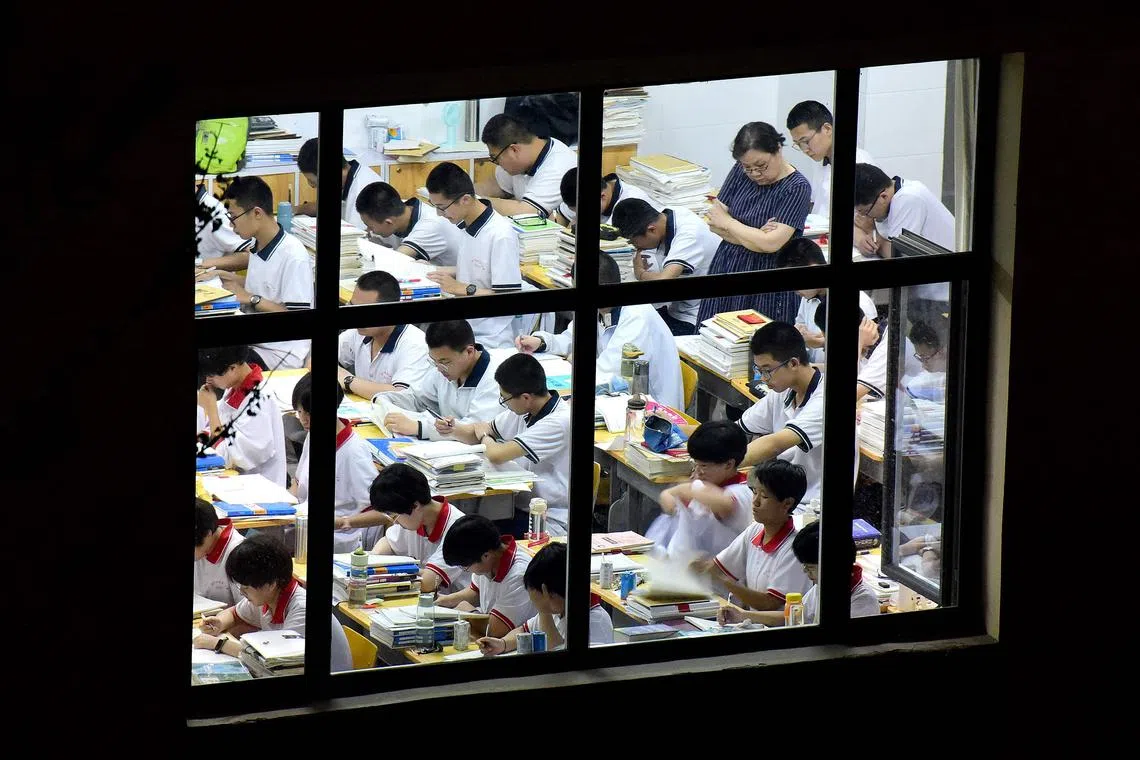China’s $133 billion tuition ban backfires, spawning black market
Sign up now: Get ST's newsletters delivered to your inbox

In July 2021, the Chinese government launched a sweeping clampdown on its private tuition sector.
PHOTO: AFP
SHANGHAI – President Xi Jinping’s attack on China’s after-school tuition industry was meant to ease the burden on households. But for many middle-class families, that effort has had the opposite effect.
In July 2021, the government launched a sweeping clampdown on its private tuition sector,
The high-profile campaign, widely known as shuang jian in Mandarin, or “double reductions”, drove legions of tuition companies into the red or into bankruptcy in some cases, and wiped billions of dollars off the market value of listed firms, resulting in tens of thousands of layoffs.
But interviews with several parents in cities including Shanghai and Shenzhen found that spending on after-school tuition actually rose for many households, especially since the start of summer holidays – the first school break since the end of Covid-19 restrictions. Parents eager to give their kids a head start in education say they have turned to expensive, underground tuition services that have mushroomed across the country.
This suggests that two years since the crackdown, one of Mr Xi’s signature economic and social policies may have fallen short of its goal. It also underscores the challenges that China faces in tackling some of its long-term structural headwinds, namely its declining birth rate and yawning wealth gap.
Many question the effectiveness of such a ban when the system of entrance exams, in which high schools and colleges admit students solely based on scores from once-a-year tests, still prevails. China’s college entrance exam, or gaokao, is notoriously competitive, with more than 10 million students taking exams each year. Getting into an elite college often means a greater chance at securing a well-paid job, meaning demand for test preparation remains strong.
“Our burden has not been reduced at all,” said Ms Sarah Wang, a 40-year-old mother who works at an e-commerce company in Shanghai.
She now spends 50 per cent more than she used to on in-person tuition sessions for her only child, a fifth grader. As her daughter starts junior high school and signs up for more difficult subjects such as physics, she expects the tuition fees, now around 300 yuan to 400 yuan (S$55 to S$74) per session, to rise further.
Middle-class parents in other parts of China speak of similar experiences, with some citing even bigger price increases. Many private tutors who used to teach big classes run by major education companies now teach smaller groups, in many cases one on one, to avoid detection by officials. To make up for the loss in student numbers, many are charging higher fees, according to parents and private tutors.
Ms Cathy Zhu, a Shanghai-based financial services professional in her 40s, said tuition for her son’s mathematics tutoring class has nearly doubled to 300 yuan per session. “As long as the high school and college entrance system still exists, there is absolutely no way to achieve such ‘reductions’,” she said.
There are some officially sanctioned, large-scale online tuition classes that are much more affordable. But many of these online classes are not popular with middle-class parents, who worry these do not offer adequate guidance and supervision.
Private tuition fees, which now easily exceed 100,000 yuan a year in cities such as Shanghai, are now being blamed for exacerbating social problems including a low birth rate and growing inequality. Rising costs of raising children, along with sky-high housing prices, are discouraging young people from getting married and having children, according to analysts. Poorer families are unable to afford private tutoring, potentially putting their children at a disadvantage in school and, later, their careers.
Competition over gaokao and the breakneck expansion of the country’s universities over the past two decades have also resulted in an oversupply of graduates without practical vocational skills needed by many employers. University graduates in China are finding it increasingly hard to find white-collar jobs amid a flagging economy. In the face of soaring youth unemployment, the government has been calling for stepping up vocational education.
“That’s the consequence of a rampant and unsustainable expansion of the higher education system in response to parents’ desire for their children not to get their hands dirty for a living,” independent analyst Andy Xie, the former chief Asia economist for Morgan Stanley in Hong Kong, said in a column published in July. “The solution is an adjustment in parental expectation.”
As the campaign nears its second-year milestone next week, the authorities around the country are ramping up their scrutiny of the tuition sector. In a recent report, the state-run China Education Daily warned of tutors engaging in illicit academic services disguised as non-curricular programmes such as singing or painting.
In Hefei, capital city of the eastern Anhui province, the local authorities carried out 77 raids of education institutions on June 28, according to a report by the People’s Daily, the flagship newspaper of the Communist Party of China. Many of those violating the rules were operating in hotels and apartment buildings, conducting curriculum tutoring under labels such as “education consultation”, the report said.
Jiangsu, a wealthy coastal province that borders Shanghai, recently renewed its crackdown on illicit tutoring classes disguised as “housekeeping” or “consulting”, state media reported. The campaign over the past two years has slashed the number of after-school tutoring firms in the province from nearly 9,000 to just 205.
The south-eastern province of Fujian recently launched a similar crackdown, mobilising neighbourhood committees to carry out inspections of tutoring activities, including summer camps. It also urged people to contact government offices to report illegal tutoring. BLOOMBERG


